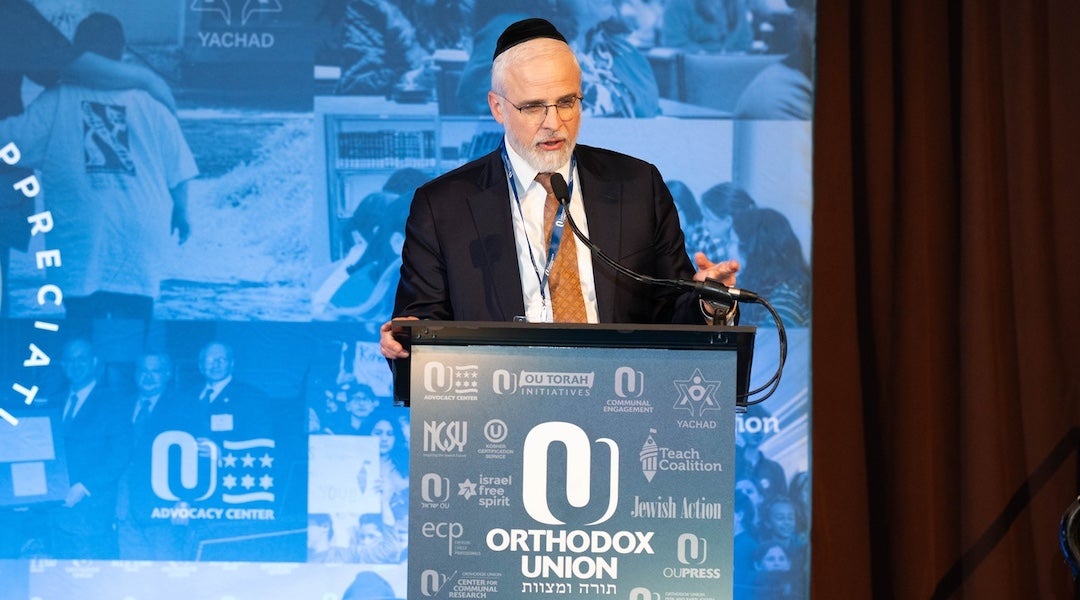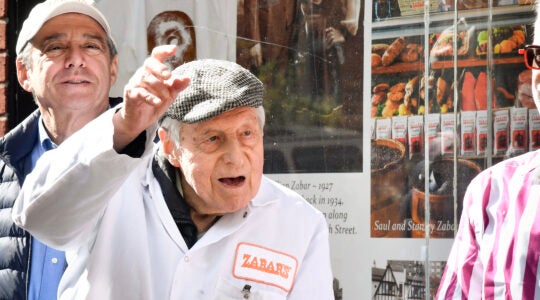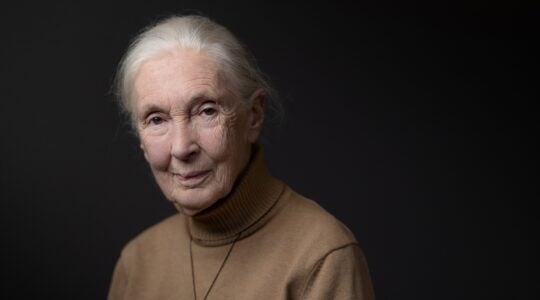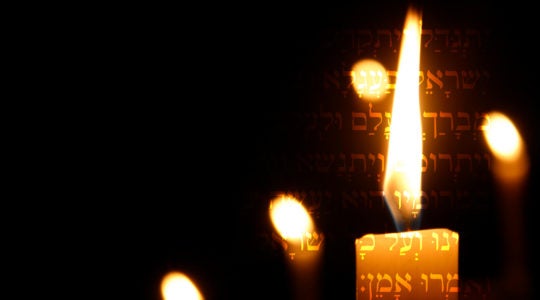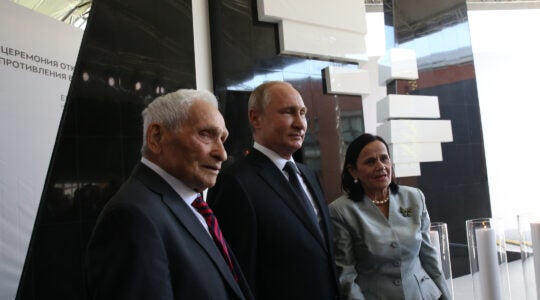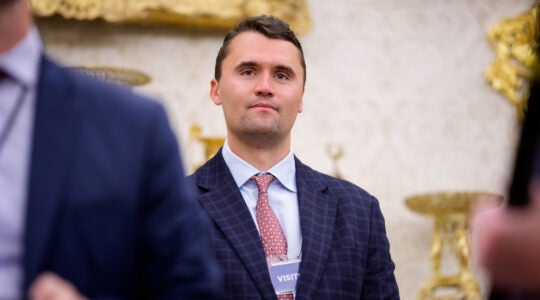American Jewry is reeling following the sudden death of Rabbi Moshe Hauer, the executive vice president of the Orthodox Union who was widely known and admired across denominations.
Hauer, the O.U.’s public face since 2020, died of a heart attack at his Baltimore home on Tuesday, the holiday of Shemini Atzeret. He was 60. His death was not announced until Wednesday night, the end of the Simchat Torah holiday.
“Rabbi Hauer was a true talmid chacham, a master teacher and communicator, the voice of Torah to the Orthodox community and the voice of Orthodoxy to the world,” the Orthodox Union said in a statement announcing his death. “He personified what it means to be a Torah Jew and took nothing more seriously than his role of sharing the joy of Jewish life with our community and beyond.”
A levaya, or funeral service, took place Thursday morning at Baltimore’s Bnai Jacob Shaarei Zion Congregation, the Orthodox congregation Hauer led for 26 years before taking the O.U. position five years ago.
“You taught us with such clarity, you taught us with such force, with such conviction, you taught us who you want us to be,” said Rabbi Daniel Rose, Hauer’s successor at the synagogue, in a speech he said was short because Hauer’s body and family were due on a flight to Israel for his burial. Pausing to cry, he went on, “I can’t ask you anymore. I think you taught us well enough that we don’t need to ask you.”
Hauer was an exemplar of Modern Orthodoxy’s historical blend of religious and secular expertise. After being ordained at Ner Israel, an Orthodox yeshiva in Baltimore, he earned a master’s degree in engineering from Johns Hopkins University. He was the founding editor of Klal Perspectives, an online journal elevating Orthodox perspectives on contemporary issues.
In 2023, Hauer testified about antisemitism on American college campuses at a hearing of the House Committee on Education and the Workforce. The hearing prompted investigations of several universities for allegedly failing to protect students from antisemitic harassment.
Sen. Josh Hawley, the Missouri Republican who in 2023 worked with the O.U. to pass a Senate resolution condemning Hamas and campus antisemitism, issued a statement saying he was “deeply grieved by the death of my friend.”
Hawley said: “His sudden death is a tremendous loss to America and to friends of Israel everywhere. Rabbi Moshe was a man of remarkable integrity and kindness, and also foresighted leadership. He was a true and dear friend to me.”
Hauer also sometimes was required to speak hard truths to his community. In 2020, he met with Anthony Fauci, then director of the National Institute of Allergy and Infectious Diseases, in forming the O.U.’s response to the COVID-19 pandemic. Hauer then urged congregations to exceed the government’s reopening guidelines. In 2023, he denounced a rampage by Jewish settlers in the West Bank, saying, “We cannot understand or accept this.”
A wide array of Jewish voices mourned Hauer and expressed shock at his sudden death.
“We just spoke this past Friday and texted on Monday, when he was overflowing with joy at the miracle of the hostages’ freedom and the unmistakable hand of Hashem in it,” tweeted William Daroff, president of the Council of Presidents of Major American Jewish Organizations. “Rabbi Hauer was a trusted advisor, cherished colleague, and wise counselor to me, a bridge-builder whose faith, humility, and moral clarity inspired all who knew him. His loss leaves a deep void for all who loved and learned from him.”
Rabbi Shlomo Peles of the Jewish Relief Network Ukraine, a Chabad organization, praised Hauer’s willingness to work with his movement.
“Rabbi Hauer constantly mobilized on behalf of the Rebbe’s Shluchim [emissaries], and especially for those in Ukraine,” Peles said in a statement. “Rabbi Hauer acted with genuine care, a broad heart, and a shining countenance.”
“Klal Yisroel has lost a leader who was universally respected as a talmid chochom of stature, a man of integrity, humility, vision, wisdom and depth,” Agudath Israel, an advocacy group representing haredi, or ultra-Orthodox, Jews, said in a statement. “Rabbi Hauer created Kiddush Hashem in all of his encounters with the outside world, and he leaves behind an impressive list of significant accomplishments. The loss to our community is incalculable.”
“The Jewish people has lost a sage,” said Rabbi Rick Jacobs, president of the Union for Reform Judaism, in a Facebook post that included a photograph of himself sitting with Hauer in the official residence of Israeli President Isaac Herzog during a communal mission in July.
Jacobs recalled that Herzog had noted with some surprise that the president of the Reform movement was sitting next to a leader of the Orthodox Union. “I told President Herzog that it was completely natural for me to sit next to my friend and cherished colleague,” he wrote. “Yes, we disagreed on so many issues but shared a profound respect and love for one another. …. Rabbi Hauer’s humble leadership helped point the way for a more respectful and mutually responsible future for the Jewish people grounded in Torah.”

Rabbi Moshe Hauer, left, meets with Israeli President Isaac Herzog at Herzog’s official residence in Jerusalem, Jan. 22, 2025. (Orthodox Union)
When he was tapped as its new executive vice president in 2020, succeeding Allen Fagin, Hauer pledged to address the rising costs of the Orthodox lifestyle — the O.U. supports federal “school choice” policies in order to offset the high costs of day school tuition — and expressed his commitment to Modern Orthodoxy, which in contrast to haredi Judaism seeks to balance a strict adherence to Jewish law, or halacha, with a deeper engagement with modernity.
“Our community expresses this commitment by engaging with the world around us, as well as with all members of Klal Yisrael and by addressing every modern issue and contemporary challenge from within the value system of Torah,” he told the New York Jewish Week at the time. “We undertake all of these responsibilities while also completely dedicating ourselves to a growing engagement in Torah study, prayer and halachic observance.”
To that point, he added, the O.U. “is completely committed to maximizing — within the framework of halacha — the engagement of Jewish women in every aspect of Jewish life. This is an organizational and communal priority.”
Sheila Katz, CEO of the National Council of Jewish Women, wrote in a Facebook post on Wednesday night that she had been so shocked to hear of her friend’s death that she texted him hoping that it was not true. She said she had just spoken to him last week, in the latest installment of an ongoing conversation that transcended their differences.
“Our very different realities came up over and over again. I loved learning how he lived his life, and he seemed to love learning how I lived mine. Difference, but mutual respect, was at the core of our deep friendship,” Katz wrote.
In the Jewish Week interview, Hauer pledged to improve “relationships beyond the confines of our community.”
That was also the message of one of his last public statements, shared on Oct. 3. In it he described the upcoming Sukkot holiday as an opportunity for connection among Jews from “ideologically diverse places.”
“Even those who usually live separately must seize opportunities for contact and connection,” he said.
Hauer’s survivors include his mother, Miriam Hauer; his wife, Mindi Hauer; their sons Yissachar, Yehuda Leib and Shalom; daughters Devorah Walfish, Batsheva Neuberger, Chana Schneiweiss and Rachel Hauer, and their spouses and numerous grandchildren.
JTA has documented Jewish history in real-time for over a century. Keep our journalism strong by joining us in supporting independent, award-winning reporting.
